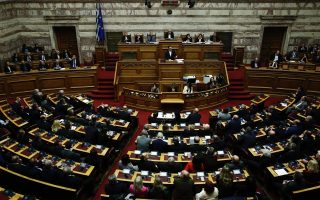The Novartis case and SYRIZA’s institutional primitivism

More telling about the leftist-led government’s treatment of its political rivals and society than the snickers of Greece’s alternate health minister, the bad-mannered Pavlos Polakis, was the parliamentary address of Prime Minister Alexis Tsipras last Wednesday: Not only did Tsipras choose to ignore the fact that Greece’s pharmaceutical spending was drastically reduced after 2010 thanks to the policy decisions of those now accused in connection with the Novartis bribery case. Not only did the premier avoid assuming any responsibility for what his party and he personally claimed while in the opposition regarding the issue of medicines and drug manufacturers. Most importantly, Tsipras did not even care to counter the arguments put forward by the political officials investigated in connection with the allegations. He behaved as if they had never addressed the House, as if the marathon 15-hour debate had never taken place.
What I would like to address here is Tsipras’s provocative arrogance, combined with his institutional primitivism and that of his associates. Because, exactly as happened in October 2016, when news emerged of his government’s devastating defeat at the Council of State, the country’s highest administrative court, over the issue of nationwide broadcast permits, also on Wednesday, the debate on the responsibility of political officials in connection with the Novartis case opened up a new chapter in the country’s rule by the SYRIZA-Independent Greeks coalition. Back in 2016, the government realized that there is such thing as a constitution in Greece and that there are judges who are determined to protect it. This time, coalition officials realized that the public is not willing to follow them down the path of lies, cynicism and discord.
SYRIZA is – to its credit – the only party which has, also as government, criticized as obsolete Article 86 of the Constitution regulating the immunities of government ministers. It is provocative in this day and age for a political body like Parliament to file charges against ministers. Speaking in Parliament, Tsipras described Article 86 as “despicable,” while former justice minister Nikos Paraskevopoulos said that reviewing it was a priority for his party. Nevertheless, the coalition is now using it against their political opponents, and they are doing so in an extraordinarily arbitrary manner.
– The accusations against the former ministers are based on testimonies by anonymous witnesses.
– The testimonies are, in their majority, blatantly unreliable, since they are based on hearsay or on assumptions of the protected witnesses.
– Witnesses were given protected status after the fact, after the case had reached Parliament and only after former Socialist minister Evangelos Venizelos had denounced the irregularity.
– Last but certainly not least, according to existing legislation, ministerial offenses have long been written off. Those offenses that are not related to the exercising of ministerial duties – such as money laundering – could actually be tried by the judiciary without the prior involvement of Parliament. For instance, if tomorrow (or even in 10 years) it was ascertained that one of the defendants has wealth that cannot be justified by income declarations, then he or she could be indicted and convicted without need for anything more.
Neither at the time of the so-called Koskotas scandal in the late 1980s nor those that followed were there such blatant irregularities.
However, as we said previously, SYRIZA officials are characterized by an institutional primitivism which makes the legal knowledge of Alternate Justice Minister Dimitris Papangelopoulos and former Supreme Court president Vassiliki Thanou (now head of the prime minister’s legal department) stand out like beacons in a pitch-black night.
Could all the above be insignificant next to the Novartis scandal? Because the case after all involves an extensive web of corruption which appears to involve thousands of “respected” doctors and an equal number of health professionals. This is what the government is betting on. “In the name of purging the system of corruption, it’s no big deal to turn a blind eye to a few irregularities” – particularly given that, as Tsipras put it, the scandal did not come out of the blue. It was fomented by politicians.
We are drilling to the marrow of the issue, I believe. Without proof, but with a manner of reasoning whose simplicity appeals to a society battered by injustice, the government is trying to smear the reputations of its political rivals, without evidence, without signs even, simply on the basis of its parliamentary majority.
Like a new Robespierre, it addresses the opposition paraphrasing the famous quote by a French socialist lawmaker: “You are legally in the wrong because you are politically in the minority.” Because, after all, this is exactly the meaning of wanting to send your opponents to jail on the grounds of vague accusations by anonymous witnesses.
We live at a time when, in Europe and the United States, under the pressure of nationalist populism, the rule of law is under threat. Turkey, Russia, Hungary and Poland are high on the black list which now also includes the US of Donald Trump. A recent book by Harvard professors Steven Levitsky and Daniel Ziblatt (“How Democracies Die,” 2018) discusses how Benito Mussolini and Adolf Hitler legitimately climbed to power before asking the question: Have we perhaps, without realizing it, shifted from the time of military coups to the time of the slow and “invisible” breakdown of democracies, with the rise of ruthless demagogues who do not hesitate to use any means possible in order to prolong their stay in power?
If Greece still does not feature on this horrible list, it is not thanks to SYRIZA’s (nonexistent) constitutional patriotism. Nor is it thanks to the fact that certain of its older officials originate from a particular political space – the so-called Reformist Left – which was once inhabited by personalities of the caliber of Ilias Iliou or Leonidas Kyrkos. It is rather thanks to the fact that, despite its systematic efforts, SYRIZA has not yet managed to hijack two institutions which are fundamental in every democracy: the news media and justice.
However, safeguarding these two institutions should not be left only up to their functionaries. It should be everyone’s business. First, however, we need to realize that their independence is at risk.
Nikos Alivizatos is a professor of constitutional law at Athens University.




